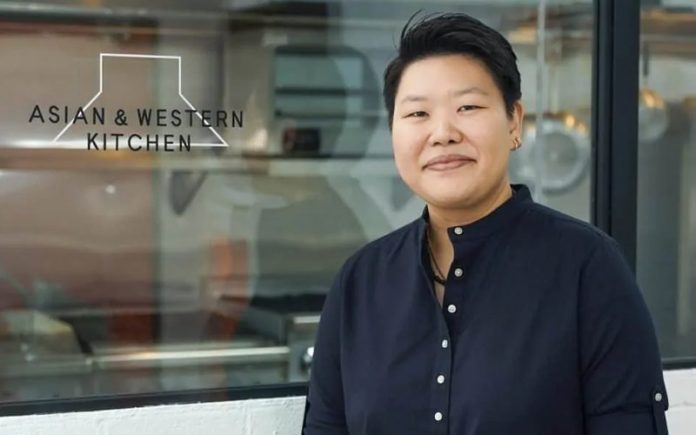
A food enthusiast, Huen Su San launched Cookhouse with the dream of building an ecosystem that brings a community of foodpreneurs together.
She tells Set the Tables that she ventured into the F&B industry five years ago, specialiasing in Korean food. Currently, the Beyond Korea Dining Group and Glasshouse at Seputeh have eight outlets and two central kitchens.
“While I was building up the business, I realised that the investment required to set up industrial kitchens are pretty high. At the same time, I also observed that food delivery was getting more and more popular.
“We are trying to build an ecosystem where it will actually flatten the learning curve for new entrepreneurs and help them grow their businesses faster,” she says, adding that the F&B industry is a highly competitive market with very thin margins and that she empathises with struggling businesspeople.
How Cookhouse makes a difference
- Lessens barrier to entry
Cloud kitchens are a more efficient way to reach the delivery markets, bringing costs down. If you wanted to set up a kitchen, whether it is a brick and mortar shop, for delivery service, or purely operating from a Central Kitchen, you would have to fork out a large investment sum for renovations and equipment.

- Licensing
If somebody starts a business from home, they don’t have the commercial license that’s required and food delivery services, or even customers might be hesitant to try.
Cookhouse is a licensed facility that will take care of all the maintenance right up to pest control.
- Scalability
Su San says Cookhouse is able to assist in getting better prices on ingredients because of bulk purchasing.
“We also work with complementary partners, like Mr Speedy for logistics, Food Market Hub for inventory management software that allows you to order ingredients online and take care of your costing calculations.
“Normally, an annual fee will be charged per year but with residency here, you can use it for free to manage your inventory.
- Ecosystem
You are joining a community of like-minded people where residents can exchange concepts.
“I am also very hands-on in working with the residents to grow their brands, communicating through WhatsApp or whenever I am here at Cookhouse. We also have in-house services for marketing, videoshoots, photoshoots, and menu styling.”
She says Halo Doughnut is their first resident and that different types of residents come in for different reasons.
“Some come in here to use this place as a mini central kitchen. Some are currently doing R&D on their menu.
“We have people who are in different junctures of their business growth and the residents help each other out. The minimum capital starts at RM900 per month per pack inclusive of utilities,” she says.

- Event space
“We host our own events like for team building exercises, we also rent out the space for kids or family parties,” she said, adding that the space can also be used to host classes, videoshoots, cooking competitions and product launches.
The delivery market is here to stay
Su San says those in F&B must understand that the landscape is changing and that the delivery business is going to be permanent.
Among the things to accommodate for in this new environment:
- Packaging that delivers well.
- Customers’ first impressions – packaging and plating.
- How to ensure food gets to customers tasting good.
- Flexibility – you can have one cloud kitchen operating on four different cuisines: Mexican, Indian, Chinese, Western but you could be the same cook.
- Buying experience – As food delivery markets grow, people need to find ways to make their buying experience more personal.
- Make an impression on the customer.
“Cloud kitchens can be both an expansion strategy or market entry strategy. For people who are considering it, it’s important that they know the reasons why they’re doing it,” Su San says.
They must also have clarity in what they are selling and who they are trying to reach so they are able to map out the costs, what’s needed, and compare that to the value a cloud kitchen can offer in comparison to launching from a traditional way, she says.
“Also to be aware of the adjustments that need to be made. In a co-working space, there will be people from other brands. Some may have particular personal preferences.
“They need to know the reasons why they’re doing it and weigh the advantages against the disadvantages.”

She explains that her way of staying ahead is to always listen to her clients and residents. “Observing what is happening in the market aids continuous growth and improvements in terms of services, operations, and even the actual infrastructure.”
She says the pandemic taught her to keep going even in hard times. “I truly believe that when there is a problem, just do whatever you can to overcome what is immediately in front of you, followed by the next step, and later on, you’ll find that the path will clear.
“I think problems start when people stop or give up,” she says, adding that many residents started their businesses during the pandemic.
“There are always new trends in this industry, you just have to keep adapting to remain relevant in the market.”
This article first appeared on Set the Tables.
Set the Tables is positioned to inspire and educate those already in the industry as much as the aspiring reader who dreams of a future in the food business, and maybe even the merely curious tantalised by the vast and irresistible universe of food and drink.


